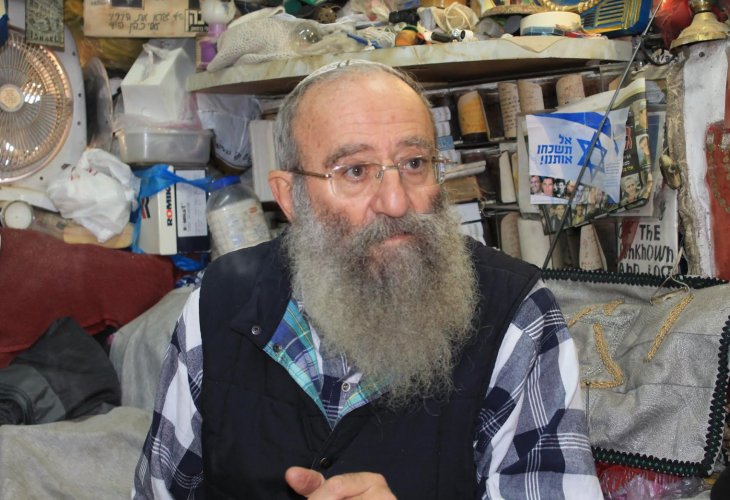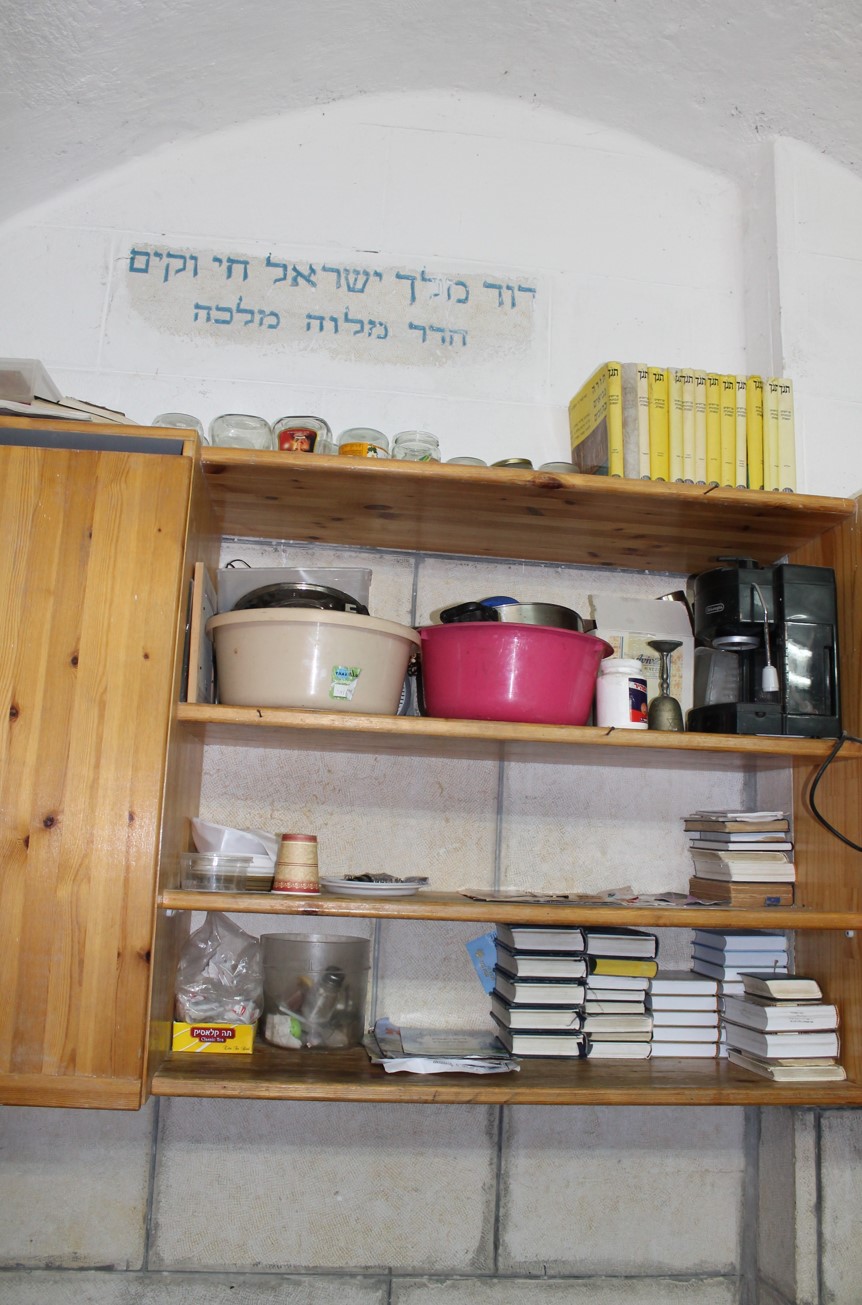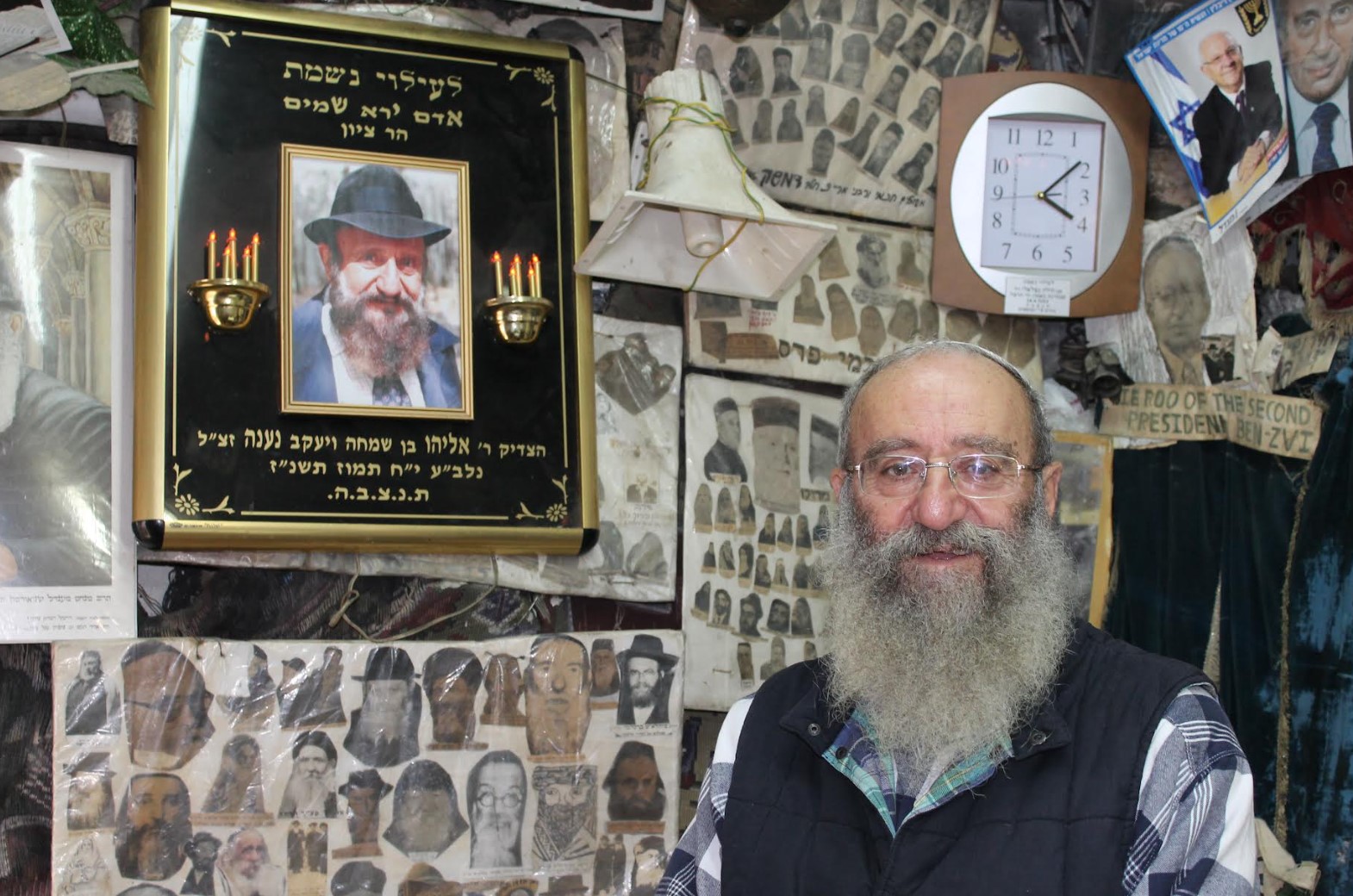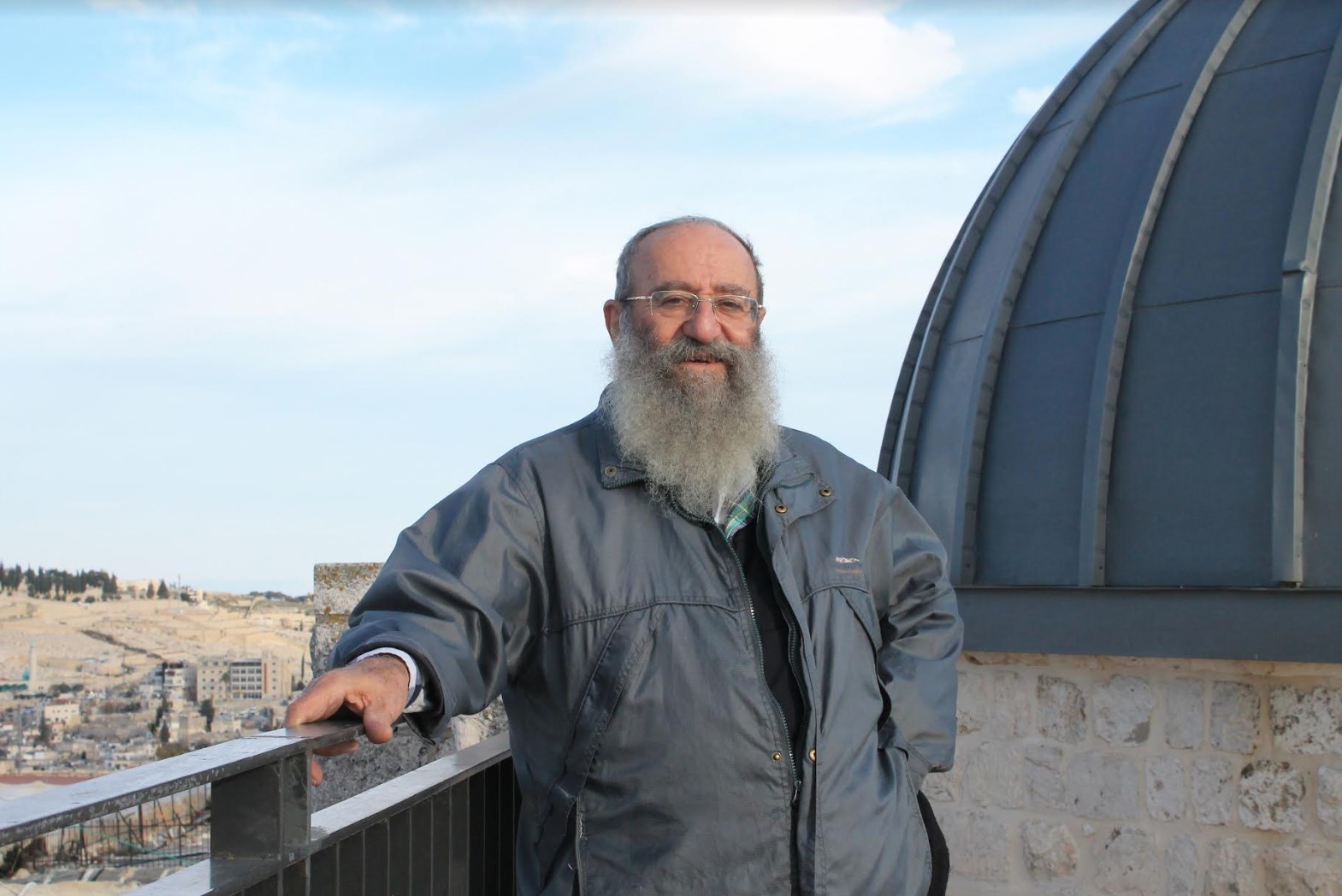A Secret Path to King David's Tomb: Stories of Courage and Mystery
Jacob Nana, in a special interview, recounts sneaking into King David's tomb through a secret tunnel under the threat of Jordanian forces, and shares a mysterious revelation experienced by his father: "My father went to look for the old man, but suddenly he disappeared."
 (Credit: 'Window to Mount Zion')
(Credit: 'Window to Mount Zion')If you've ever visited the site of King David's Tomb in Jerusalem, you might have noticed the side stairs that seem to lead nowhere. Every day, Jacob Nana climbs those steps to his small, secret room on the roof of the tomb. From there, he quietly overlooks the Western Wall, singing Psalms with a gentle melody.
Jacob Nana is the son of the late Jerusalemite sage, Elijah Nana, the first to dare to open King David's Tomb after the War of Independence. "The Old City was captured by the Arabs during the war, and most of its inhabitants were taken captive," Jacob recalls in a special interview. "Mount Zion became desolate, its streets emptied, and even the cats disappeared. The Muslim families fled, fearing Jewish revenge. Since then, my father took the keys to King David's Tomb and, for nearly twenty years, opened and closed the complex."
How did he get the keys?
"When the Muslims fled, they left everything behind. My father found the bunch of keys discarded in one of their houses, and so, after hundreds of years in Muslim hands, King David's Tomb came into Jewish possession."
A Presidential Study Session
"When we arrived at the site, the entire complex was empty," Jacob reminisces about those days. "My father turned the hall on the first floor into a large central synagogue. We painted and cleaned it ourselves. Back then, there were no construction workers or cleaners; we did it all alone."
The second floor remained locked, while a small, mysterious room stood on the top floor overlooking the Western Wall. Elijah Nana turned this into a study and prayer room. "My father would sit in the presidential room, reciting Psalms. He transformed it into a place for prayer and study, hosting Torah classes for those who visited the tomb."
 Inside the president's room (Credit: 'Window to Mount Zion')
Inside the president's room (Credit: 'Window to Mount Zion')"It's a special story," Jacob says, excitedly. "The second president of Israel, Yitzhak Ben-Zvi, used to take evening walks in the Mount Zion area. One day, he heard prayers coming from the rooftop and went up to check. He knocked, and my father opened the door. Since then, they made it a regular study session whenever the president was in the area. After President Ben-Zvi passed away, my father dedicated the room to his memory and named it the 'presidential room'."
 (Credit: 'Window to Mount Zion') Jacob inside the presidential room with a picture of his late father in the background.
(Credit: 'Window to Mount Zion') Jacob inside the presidential room with a picture of his late father in the background.Jacob also shares that because the Western Wall was under Jordanian control at the time and inaccessible, Jerusalem residents brought notes to his father, Elijah, who found a creative solution: "My father would scatter breadcrumbs around the rooftop and place the notes alongside them. In the afternoons, pigeons would come, peck at the crumbs, and take the notes with them."
To where?
"We never knew for sure where they took them," he shares. "But later, when the Temple Mount was liberated, we found those notes placed between the stones of the Western Wall."
The Secret Tunnel
After the War of Independence, IDF soldiers breached the walls of Mount Zion and paved an official road to King David's Tomb. "Until then, entrance was only through Zion Gate, but after the breach, it became the fence separating Israel from Jordan, making it life-threatening to cross. We would ascend to Mount Zion through the secret tunnel starting from Sultan's Pool."
The tunnel Jacob speaks of was dug by IDF forces to connect the neighborhoods at the Jerusalem border to Mount Zion and the Old City. "We would descend into the tunnel, making sure the Jordanians didn't see us, and emerge at Mount Zion. The Jordanians often aimed and shot at Jews ascending the mount, and the tunnel served as camouflage for us."
Weren't you afraid to provoke the Jordanians?
"Father was brave in his faith," he says passionately. "He would take me, his only young child, and we would crawl through the tunnel, emerging on the other side with the Jordanians on the wall aiming rifles at us. He had faith in Hashem that nothing would happen to us."
Does this tunnel still exist?
"Yes. It was lined with tin, and over the years, vegetation grew over it, causing its top to erode and collapse due to moisture. Recently, it was renovated and turned into a unique tourist site."
The Revelation of King David
Until the war, Elijah Nana was mainly known for his small corner grocery store on Zephaniah Street in the Geula neighborhood. Old Jerusalemites still remember him sitting at the old counter, reciting Psalms, and selling individual licorice candies. "It was the era of austerity, and he sold single cigarettes and half glasses of soda because who could afford a full glass," his son recalls nostalgically. "One day, my father came home and told my mother: 'How long will I sit and sell in the grocery? Let's go to King David's Tomb and pray that war doesn't break out.' They boarded a bus, got off at King David Hotel, and walked to Mount Zion."
"When they arrived at King David's Tomb, mother pointed and said: 'Look, I think I see an old man standing at the entrance.' Father approached and warned the old man about the proximity of the border. 'Pope's Way' (now 'Derech Shalom') was then the border line separating Israeli from Jordanian territory, making it life-threatening to approach. As you said before, the Jordanians fired to kill."
 (Credit: 'Window to Mount Zion') Jacob on the roof of King David's Tomb
(Credit: 'Window to Mount Zion') Jacob on the roof of King David's Tomb"Father told the old man they were heading to the presidential room to pray for the people of Israel that no war breaks out, and even if one does, that Israel wins. The old man replied: 'You will pray above, and I will pray below, and together our prayers will be well-received.' My parents went up, and mother boiled water and made tea. Father took a cup down to the old man, asking if he wanted anything else. The old man said: 'Only if you have something.' Father ran to the Yemin Moshe neighborhood, went into a small store about to close, and bought half a loaf of bread, a slice of salty cheese, and black olives by weight. The owner wrapped it all in newspaper, and father hurried back to Mount Zion to give the meal to the old man."
"The old man reached into his pocket, took out two coins, and offered them to my father. Father refused, saying: 'I do not want any reward in this world.' At that moment, the two coins melted into a gold ball in the old man's palm. The old man looked at my father and said: 'I bless your only son, that you will merit to see grandchildren and great-grandchildren dedicated to Torah.'
"Father returned to the presidential room, and mother told him: 'You brought him food; now bring him another cup of tea.' Father went down again to look for the old man but couldn't find him. He searched for any remains of the meal but found neither newspaper nor breadcrumbs nor olive pits. He returned to the room, kept praying, and suddenly asked mother if she heard what he did. A violin hanging on the wall started playing by itself. When they stopped praying and studying, the violin stopped."
The story becomes even more mysterious...
"Indeed," Jacob says. "Even my parents felt something extraordinary had happened, so that very day, after nightfall, they visited Rabbi Mordechai Sharabi to tell him everything. They agreed that they'd only knock if the light in his house was on. When they arrived, the light was on, but the house was silent. They turned to leave when suddenly the rabbi's wife opened the door, saying: 'Don't leave, Elijah. The rabbi is waiting for you.' Father entered, and the rabbi instructed him: 'Tell me everything you saw.' Father shared everything, and then Rabbi Sharabi closed his eyes and told him: 'You merited to see King David. You merited to see King David.'"
"The Jews' Shoes Disappeared"
Finally, we ask Jacob what is hidden on the middle floor of King David's Tomb complex. "It is indeed a mystery without a clear answer," he says. "I can tell you that in the past, when the tomb was still under Muslim control and Jews would come to pray on Shavuot, the Muslims charged them money to enter the lower and middle floors. They also ordered the visitors to remove their shoes and ascend barefoot due to the sanctity of the place, but after the prayer—the Jews' shoes disappeared..."
"Some claim that King David is actually buried on the middle floor, but it's unlikely. In those days, burials were only done in the ground or caves. The practice of floor burials is a recent innovation. For instance, at the Prophet Samuel’s Tomb, Samuel is buried in the basement, while the upper floors have, in contrast, Muslim graves. If you visit King David's Tomb one day, you might come to my presidential room, and perhaps I'll take you to the middle floor," he says with a half-smile. "But until then, let us all pray for complete redemption and the resurrection of the dead, and with King David, we will sing the Psalms in holiness and purity."

